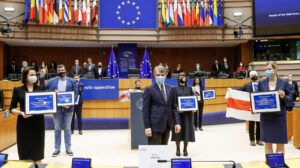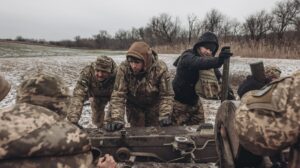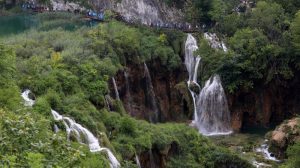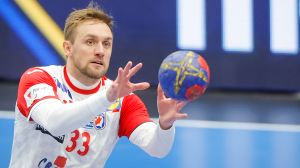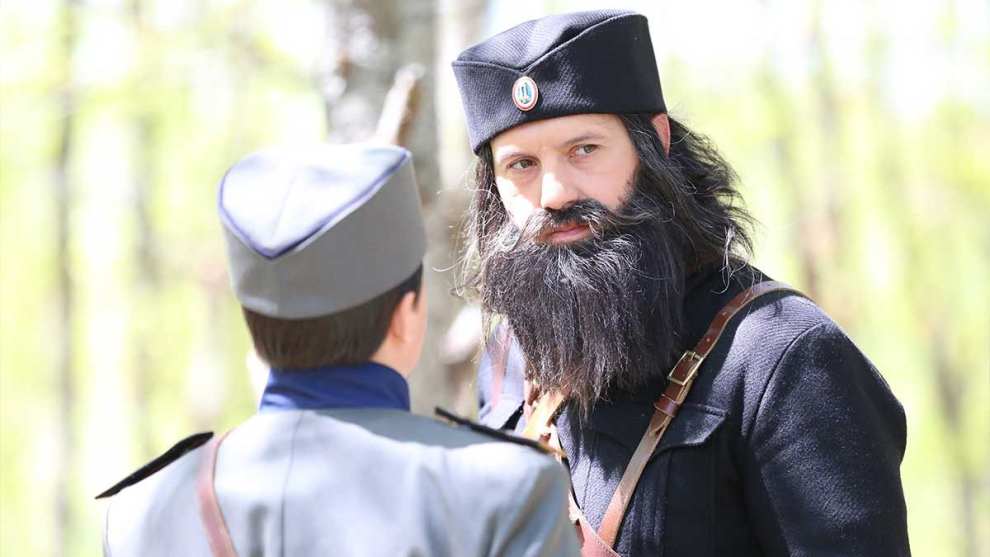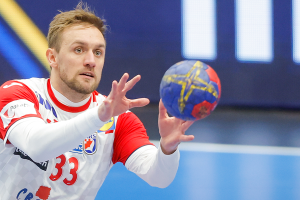When two historians from Belgrade gave a lecture in Zagreb about the Serbian nationalist Chetnik movement during World War II, it highlighted some unusual connections between Serbian and Croatian right-wing academics.
A lecture given by two well-known Serbian historians in Zagreb earlier this week has caused controversy in Croatia because it appeared to show sympathy for the Serbian nationalist Chetnik movement in World War II.
The lecture at the Croatian Institute of History in Zagreb on Tuesday was entitled ‘The Bosnian Golgotha of the Chetniks in 1945’ and was given by Bojan Dimitrijevic and Nemanja Devic from the Belgrade Institute for Contemporary History.
It looked at the Chetniks’ retreat through Bosnia at the end of World War II as the Communist-led Partisans liberated Yugoslavia from occupation by Nazi Germany and its local allies, and talked about the suffering that the Chetnik troops led by Dragoljub ‘Draza’ Mihailovic endured, without highlighting the crimes that they committed.
The controversy around the lecture was heightened by the presence of a former member of the Croatian government, ex-Culture Minister Zlatko Hasanbegovic, who is now an MP representing the nationalist Bloc for Croatia party. As well as drawing media attention, Hasanbegovic’s presence annoyed the right-wing Homeland Movement party, which shares its parliamentary caucus with the Bloc for Croatia.
The Homeland Movement’s parliamentary caucus called on Hasanbegovic, who leads the Bloc for Croatia party and is its only MP, to apologise for attending the lecture by the two Serbian historians.
But Hasanbegovic argued that he didn’t actively participate in the event.“I went there, sat down, listened to the lecture and then went home. I didn’t say anything. It is not clear to me why I would have to apologise now,” he told Novi List newspaper.
Historians Dimitrijevic and Devic, authors of the book Bosnian Golgotha, have been accused of historical revisionism and of attempting to rehabilitate the Chetnik movement. Although such ideas are not unusual in Serbia, until this week they had not been publicly presented at a prestigious institution in the Croatian capital.
The organiser of the lecture, the Croatian Institute of History, has also been accused in the past of interpreting historical events from a right-wing point of view. Some historians claimed that the invitation to Dimitrijevic and Devic showed that Croatian and Serbian right-wingers have closer connections than many thought.

‘A complete reversal of history’
Dimitrijevic, one of the Serbian historians who gave the lecture, sought to dismiss the fuss about ex-minister Hasanbegovic’s attendance.
“Hasanbegovic was there as a colleague who deals with that topic. This reaction to Zlatko shows that the Bolshevik spirit still lives on,”he told BIRN.
He explained that the Croatian Institute of History has been cooperating with the Belgrade Institute for Contemporary History for over 15 years. He also denied that he was engaged in historical revisionism, rewriting the past for political purposes. “I reject the term revisionism, it is a Bolshevik term. Every science must move forward, and new times seek their own reading of history,” he said.
“We presented relevant research, new research, and that is something new. And the fact that people listening from outside have some preconceptions that we are some kind of extreme right or revisionists, we can’t help them [with that], that’s just the way it is,”he added.
But Croatian historian Ivo Goldstein, a professor at the Zagreb University Faculty of Philosophy and a former Croatian ambassador to Paris, suggested that right-wing historians in Serbia and Croatia were making common cause out of their shared antipathy to the Partisans, whose victory in World War II put a left-wing regime in power for decades in Yugoslavia.
“The Croatian Institute of History has been known for its revisionist outbursts for years, and finally, together with its counterparts in Serbia, it has come full circle. They found themselves a common interest, which is to expose the Partisans as a criminal organisation and to portray them as the guilty party in the war,” Goldstein told BIRN.
He argued that there are people at the Croatian Institute of History who also play down the crimes committed at the World War II-era Jasenovac detention camp, which was run by the Ustasa movement during the rule of the Nazi-allied Independent State of Croatia, NDH.
“Talking about the ‘Chetnik Golgotha’ in 1945 cannot even be called funny,” Goldstein said.
“The Chetniks were a criminal organisation that committed mass crimes in [the town of] Fojnica [in Bosnia] during the last months of the war, and now to declare them victims of the Partisans, who were a liberating force, is a complete reversal of things,”he added.

Nationalists ‘share common ideas’
Hrvoje Klasic, an associate professor in the history department at Zagreb University’s Faculty of Philosophy, pointed out that historical revisionism on the topic of World War II has been a constant factor in Croatia for over 30 years, since the war to secede from Yugoslavia began.
“From 1990 to 2000, over 3,000 monuments dedicated to the anti-fascist struggle were demolished in Croatia. Over two million books that talked about the Partisan movement or were written in Cyrillic were removed from libraries,” Klasic told BIRN.
He argued that nationalists and historical revisionists in Croatia and Serbia share some ideas.“The common denominator of both Croatian and Serbian nationalists and revisionists is anti-Communism,” he said.
The victory of the Communist Partisans in World War II still irks them, he also argued: “Of course they are angry about that and use every opportunity to highlight the crimes of the Partisan movement.”
However, Klasic argued that the situation in Croatia has improved since the 1990s. “Streets that were named after members of the Ustasa movement are losing those names,” he said. “In the mainstream media, you will not hear the glorification of the NDH or the denial of the crimes at Jasenovac, which you could hear in the 1990s.”
After the controversy about the ‘Chetnik Golgotha’ lecture erupted, the director of the Croatian Institute of History, Miroslav Akmadza, issued a statement defending the event on free speech grounds.
“It is an integral part of scientific cooperation. The Croatian Institute of History has never implemented censorship in the sense that we discuss any topic whether someone likes it or not,” Akmadza said.
But Klasic accused the institute of double standards: “They call for openness, but they certainly won’t invite anyone to talk, for example, about Serbian historians’ view about the war in Croatia,” he said.
Source: balkan insight









